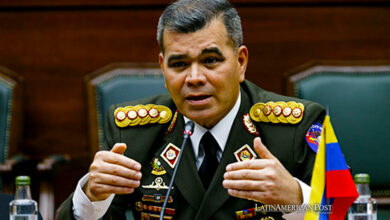The political landscape of Uruguay was shaken as Foreign Minister Francisco Bustillo stepped down amidst a scandal involving alleged efforts to obstruct justice in a high-profile drug trafficking case. His resignation follows the publication of audio recordings where he seemingly advises a former deputy to withhold evidence from investigators, spotlighting issues of corruption and governance in the country.

Photo: X/MRREE_Uruguay
The Latin American Post Staff
Escucha este artículo
Leer en español: Intriga política y resignación en Uruguay
A Dramatic Turn of Events
In a dramatic turn of events that has sent ripples through Uruguay's political establishment, Francisco Bustillo, the country's Foreign Minister, resigned after being ensnared in a scandal that underscores the often-blurred lines between law enforcement and political maneuvering. The controversy centers on audio recordings released to the public, where Bustillo appears to urge his former deputy, Carolina Ache, not to cooperate with an ongoing investigation into a passport issued to an accused notorious drug trafficker, Sebastian Marset.
Resignation and Institutional Integrity
The resignation of Bustillo, who had served since July 2020, is more than a mere political upheaval; it's symptomatic of deeper governance issues within Uruguay. His decision to resign, purportedly to avoid the misuse of his authoritative position, hints at the delicate balancing act between maintaining institutional integrity and personal loyalty.
This scandal originated with the peculiar circumstances surrounding the issuance of a Uruguayan passport to Marset. At the same time, he was detained in Dubai in 2021. Marset, a figure described as "dangerous" and allegedly the leader of a criminal network spanning across South America and into Europe, has since been at the center of multiple international criminal investigations. His involvement in the drug trade and alleged orchestration of the murder of a Paraguayan prosecutor in Colombia in 2022 adds a layer of international intrigue and urgency to the case.
The audio release brought into focus Bustillo's alleged attempt to influence Ache's response to the investigation. Ache had resigned previously and declared her unwillingness to partake in what she perceived as criminal activities. This move throws Bustillo's actions and motives into sharp relief. Her public stance underscores a commitment to legal and ethical standards, standing in stark contrast to the path Bustillo is accused of taking.
The reverberations of this scandal were immediate, with opposition leaders calling for the dismissal of not only Bustillo but other top officials as well. This collective outcry reflects growing public frustration and skepticism toward the government's commitment to transparent governance, especially in matters intertwined with criminal activities and international drug trafficking.
Bustillo's Defense and Erosion of Trust
Bustillo's defense, arguing that the conversations with Ache were taken out of context and asserting that there was nothing illegal about Marset's passport issuance, does little to alleviate concerns about possible misconduct. His promise to clarify these issues after his testimony to prosecutors indicates an attempt to regain control of the narrative and defend his actions. Yet, the damage to public trust and his credibility might be irreversible.
This scandal also highlights Uruguay's challenges in dealing with international crime syndicates. The case of Marset, who successfully evaded capture multiple times, including a notable escape during an extensive search in Bolivia, speaks to the complexities and frustrations in combating transnational criminal organizations. The involvement of a high-ranking political figure in potentially hindering an investigation related to such a criminal underscores the challenges of governance in the face of sophisticated, borderless criminal enterprises.
Also read: Elections in Argentina: Patricia Bullrich Toughens Her Speech
Toward a National Discourse on Politics, Justice, and Organized Crime
As Bustillo prepares to testify and further address the media, the political, legal, and ethical implications of his actions and subsequent resignation will continue to unfold. His case is a critical reflection point on political integrity and the fight against organized crime in Uruguay.
Moreover, this episode questions the effectiveness of Uruguay's institutional safeguards against corruption and political interference, especially in high-stakes situations involving international crime and justice. Whether Bustillo's resignation will lead to a broader reassessment of political practices and ethics within the country remains to be seen. However, it undoubtedly sets the stage for a national, if not regional, discourse on the intersection of politics, justice, and the enduring reach of organized crime.





